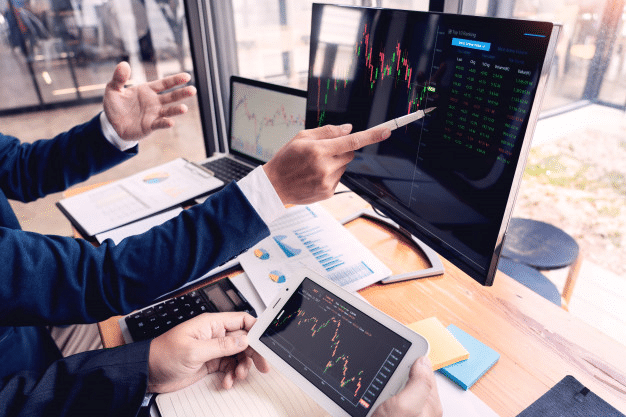The foreign exchange market is an international decentralized market for the trading and exchange of currencies. This market estimates the rates of foreign exchange of every currency across the globe. It also includes every aspect of exchanging, selling, and buying currencies at determined or current prices.
Who Is A Forex Broker?
A forex broker is a firm that offers traders with a platform for selling and buying currencies. Every transaction in the forex market takes place among different currencies, and so the forex trader either sells or buys the specific pair they seek to trade. A forex broker is also referred to as currency trading brokers and retail forex brokers. Most of the forex broker firms deal with a minor portion of the entire volume in the forex market. The retail currency traders employ the forex brokers to get access to the 24-hour foreign currency market for the purpose of speculation. The more significant firms like the investment banks also provide forex brokerage services to institutional clients.
What Is The Role Of The Forex Broker?
Enlisted below are the different roles and functions of the forex broker.
1. Establish a link between the foreign exchange market and the trader
The forex brokers make it possible for individuals traders to get access to the foreign exchange market. The retail traders hold insignificant proportions of the large foreign exchange. It is therefore infeasible for individual retail traders to trade with the significant players in the forex market. And so, the forex broker plays the role of a bridge between the retail foreign exchange trader and the forex market by providing a platform for trading.
2. Conduct trading on behalf of the individual retail foreign exchange trader
The forex brokers often offer the service of trading in the forex market on behalf of traders. The broker assists the individual trader in establishing a link with the major traders in the forex market. As such, whenever the major trader conducts trading in the forex market, he invests a particular percentage of the individual trader’s money as well. The retail trader then receives a portion of the profit from the profits of the trade. This mode of trading is highly profitable as the bigger players of the forex market are highly experienced in trading and investment, and can make the cuts with ease.
3. Make efforts to educate the trader
The forex broker offers education to the individual traders. Retail traders can access the platform of online forex brokers to learn about trading strategies and tricks for making profits. The forex broker also helps the retail trader to practice demo trading through a demo account before taking part in live trading.
How Much Is The Forex Broker Fee?
The forex broker may charge around $1 for every $100,000 of currency pair exchange. If a retail trader purchases $100,000 EUR.USD, then the forex broker receives a commission of $10.
What Are The Risks Of Foreign Exchange Trading?
Active trading in the forex market involves a variety of risks. The trading can either generate skyrocketing profits or incur terrible losses. An in-depth understanding of the risks and close supervision of the market factors can help to curb the losses to a great extent. Look out for the following risks while trading in the forex market.
1. Margin risk
Leverage risk or margin risk comes with margin trading. Margin trading permits the trader to use the leverage. If the leveraging ratio is too high, then the losses may spiral beyond control. Conduct leveraged trading by enhancing the size of your position in proportion to the borrowed capital.
2. Interest rate risk
The fluctuations in the interest rate expose the trader to interest rate risks. Careful monitoring of the changes in the rates of interest can indicate where the big institutions are making investments for higher returns on their assets.
3. Volatility risk
Volatility risk is the risk that the traders get exposed to because of the high degree of fluctuation within the forex market that results in sudden losses in trade. However, the volatility of the forex market has positive aspects as well, as there can be no profit-making without volatility. The volatility creates pressure in the market that drives the supply and demand dynamic and enables traders to make profits.
4. Broker risk
It is essential to make sure that the broker is honest and reliable before taking part in forex trading.
